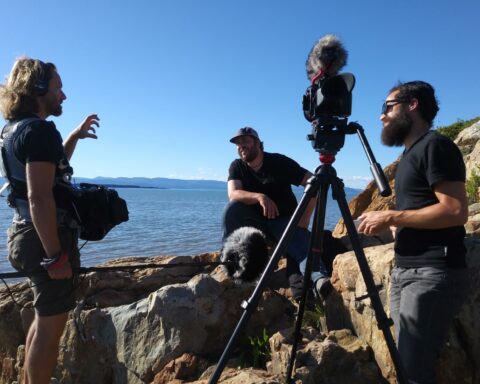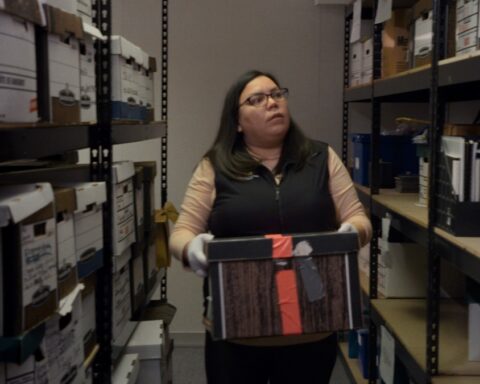Legendary Hollywood producer Robert Evans opens his 1994 memoir, The Kid Stays in the Picture, with what has become an immortal line: “There are three sides to every story: yours, mine and the truth.” This succinct meditation on subjectivity would also work beautifully as an introduction to the 2003 documentary based on the memoir. That film seemed the quintessential postmodern documentary, self-consciously suggesting that where history is concerned, there is no one Essential Truth, just as the theorists had suggested.
But while Hollywood lore might generate some disagreement, it can’t hold a candle to the controversy fired up by Middle East politics and history. A Canadian documentary team would learn just how contentious telling the story of the region can be when they negotiated a deal to sell the same basic documentary to several different regions at varying lengths.
The filmmakers’ story winds back two years, when Israeli-born, New York-based director Ilan Ziv floated the idea of making a documentary about the Six Day War of 1967. Ziv had been living in Israel at the time of the War. Then 17, he says living through that six-day period was both traumatic and unforgettable. “Everyone remembers precisely where they were and what they were experiencing,” he says now. “The country was existentially threatened. We didn’t know what was going to happen.”
Ziv spoke with Montreal-based documentary producer Ina Fichman, who liked the idea. The timing was certainly good: June 2007 would mark the 40th anniversary of the conflict, providing the documentary with a solid hook for broadcasters and distributors. And the War certainly was rich fodder for analysis; many point to it, and its ultimate resolution, as a pivotal moment in the history of the troubled region, its fallout still felt to this day.
A brief synopsis of this complex event, which arguably changed the whole dynamic of global politics, is in order. During one tumultuous week in June 1967, Israel’s military forces rallied and defeated the armies of Egypt, Syria and Jordan. The crisis was ignited by a false report, with the USSR intelligence warning Egypt of an Israeli military build- up on the Syrian border. Egyptian President Gamal Abdel Nasser enlisted his largely under-trained army, began banging the drums of war, kicked UN peacekeepers out of the Sinai Peninsula and announced that Israel’s access to the Indian Ocean had been cut off. Understandably threatened, Israel appealed to US President Lyndon Johnson for help, but he declined, concerned that siding against Soviet allies could set off an even more dangerous world conflict.
Left to fend for itself, Israel fought a war on three fronts. When it was over, Egypt’s Gaza Strip and Jordan’s West Bank territory were part of the Jewish state, and Jerusalem’s borders were reconfigured.
I watched Ziv’s Six Days in awed wonder. Indeed, it’s pretty devastating stuff. Many in the region saw Israel as a Western invention, a colonizing nation hostile to Arab citizens. Israel, mean- while, saw Arab hostility all around it. There was a degree of validity to both perspectives.
You can see how the reshaping of borders resonates to this day. Here is a great big piece of the puzzle, the reason why the Middle East is so acrimonious a place now, a region of cocked guns full of ominous signs of increasingly devastating death and destruction. As well as describing the various political and military maneuvers, Six Days manages to bring to life the personalities involved, pondering the motives of Nasser and Israeli Prime Minister Levi Eshkol, while detailing Israel’s then-Defense Minister Yitzhak Rabin’s spiral into a nervous breakdown.
Six Days is an unbelievably intricate balancing act. Ziv, writer Stephen Phizicky, creative consultant Jon Kalina, editors Ben Duffield and Alfonso Peccia and Fichman have managed to strain through the dense layers of information, revisiting the conflict accurately while offering new perspectives on the crisis. From early on, the team knew they were dealing with an epic task. “It has been an incredible amount of work,” Ziv says of the process. “But I think we’ve done
a good job of conveying the complexity of the situation. This war has been a harbinger of what people are living with now.”
“The entire time we were working on Six Days, we knew how contentious the material was,” adds Kalina. “This is a bit like the abortion issue—you can’t really discuss it without things getting heated.”
Adding to the complexity of the situation was the fact that Six Days was to be prepared in several different versions. Documentary filmmakers, of course, are familiar with versioning. It happens all the time—a broadcast version, a theatrical, a festival cut, and so on. But the versioning for Six Days was a process befitting, well, the Middle East.
The filmmaking team acknowledges that life began imitating art as their series of deadlines drew near. Like the vast majority of productions today, Six Days relied on international monies; it’s a France/Israel/Canada co-production. This meant several versions of Six Days had to be edited simultaneously: a three-hour version for Israeli TV; a French-language version for Radio-Canada and ARTE TV in France (but these two markets demanded slightly different versions even though both were in French); a German TV version; a PBS (America’s Public Broadcasting Service) version and a theatrical release cut.
In fact, the filmmakers concede that the various versions were not only dictated by length (the Israeli one was longest), but also by ideological considerations and sensitivities. “The different versions of the film warrant a PhD dissertation,” says Kalina. “Israel’s status as an underdog is definitely enhanced in the American version.”
The whole issue of versioning a film about a topic this contentious and politically loaded certainly raises the issue of why there was no English- language version commissioned by the CBC. “We didn’t manage to get there,” Fichman says with a sigh, “We tried.” A quick call to CBC head of documentary, Michael Claydon, and I learned that scheduling Six Days this spring was a dilemma for the main network. “With hockey in full swing, this was a problem,” he told me. Looking back on Canada’s public broadcaster’s history and doc mandate, which apparently calls for focus on “contemporary political and social issues,” the historically-based Six Days seems less relevant to their concerns. Both CBC and Newsworld felt that if Six Days was to air on PBS, the problem was solved: Canadians would have access to the doc if they wished to see it.
But that in turn raises problems for Canadians. According to those behind Six Days, the PBS version was the most constrained. Unlike other versions, there’s no mention of the displacement of 6,000 Palestinians, something that occurred during the War. In fact, Ziv so disliked the PBS version that it prompted him to create a theatrical version, where the director felt he could include any punches that had been pulled by the American network. The theatrical release certainly brought good fortune to Six Days; his version garnered very positive reviews from Variety and Entertainment Weekly.
Fichman describes the reasoning behind the version designated for a broad American audience as being brought about by PBS’ concerns about their audience’s attitudes towards the ongoing conflict, as well as a perception of what their subscribers might make of a sharper critique. She says certain scenes were cut due to notes provided by PBS, indications that certain things were better left out in America.
On the eve of its broadcast several months ago, Ziv seemed to be playing down the impact Six Days might have. He told me that the documentary “won’t radically change your perceptions of the war,” but went on to say that “it does bring new dimensions to the conflict.”
What Ziv didn’t seem to anticipate was the controversy that would ensue over the versioning of the documentary itself. In the June 2 weekend edition of the Globe and Mail, I wrote a piece about Six Days and its various incarnations, titled “Five takes on Six Days.” In the piece, I recounted the filmmakers’ tales of versioning.
Toronto Star media columnist Antonia Zerbisias, who contacted Fichman and requested both the theatrical and PBS cuts of the documentary, read that piece. Zerbisias’s subsequent June 8 column, “Viewers get whitewashed version of history,” slammed the CBC and PBS and lamented that Canadians would not have greater access to the Israeli or European versions, which, by the filmmakers’ own estimation, were much more complete.
This news coverage prompted a thoughtful response from PBS ombudsman Michael Getler, which was posted online on June 8. It quotes Margaret Drain, vice president for national programming at PBS affiliate station WGBH, who stated that American audience sentiment and subscriber-base concern were simply not factors in any of the decisions they made. She said that the suggestion they’d bowed to such pressures, “is simply not true. We would never make such a decision.”
Despite the brouhaha, Fichman says she has “no regrets whatsoever” about producing the film. Yes, there were headaches, she confirms, but Six Days remains an achievement, with overwhelmingly positive reviews that praised the film’s evenhandedness in tackling such a wildly contentious topic.
Ironically, the Israeli version is the one that includes the most amount of information about how the War’s fallout affected the Palestinian populace. Part of that was due to a greater length, but it also has to do with the Israeli media. “There is a lot of criticism of Israeli government action within Israel,” Fichman notes. “Much, much more than people seem to have a stomach for here.”
And the process of making Six Days itself gave Fichman a sense of optimism. “Given that there were three co- production countries, six broadcasters and a few funding agencies, it took a lot of patience and good faith amongst us to arrive at a consensus for every version. It was challenging and often difficult, but ultimately fulfilling.”











